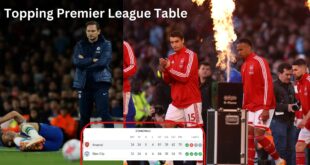A knockout competition can produce wonderfully perplexing outcomes. Saint Peter’s and Oakland can beat Kentucky. The New York Giants can conquer the New England Patriots (twice). Morocco can defeat Spain and Portugal in consecutive games, while the Premier League — by far soccer’s wealthiest league — can exit UEFA competitions early.
The quarterfinal round of Champions League and Europa League matches wiped away lots of English hopes and storylines. Manchester City’s chances at a “Double Treble” vanished with Antonio Rüdiger’s deciding spot kick and a second knockout loss to Real Madrid in three years. Liverpool’s hopes of sending Jurgen Klopp into retirement with their own unique treble — League Cup, Europa League, Premier League — ended when an Atalanta comeback quickly fizzled.
Arsenal’s continued rebirth is still on track, but dreams of a first Champions League semifinal in 15 years broke apart in the same place many of its 21st century Champions League dreams have died: Munich. With West Ham also falling to Bayer Leverkusen, only Aston Villa’s late-goal-aided comeback win over Lille in the Europa Conference League kept England alive in any competition.
Meanwhile, Barcelona lost both its lead and composure against PSG, Germany’s two biggest clubs are in the Champions League semifinals for the first time since 2012, and Bayer Leverkusen which took eight points from those two heavyweights this season remains incapable of losing in the Europa League.

Though these tournaments are random as all hell, we always immediately rush to the narrative machine after interesting results happen. The Premier League is criminally overrated! The Bundesliga is pathetically underrated! PSG was playing chess while everyone else played checkers! So after taking a few days to reflect on what we saw let’s talk about what we did — or didn’t — actually learn from these amazing quarterfinal rounds.
The Champions League quarterfinal results also were not a victory for European parity. The Premier League might be the richest league, but this year’s semifinalists still ranked first (Real Madrid), fourth (PSG), sixth (Bayern) and 12th (Borussia Dortmund) in overall revenue in 2023; in fact, in terms of raw revenue, PSG beating Barcelona (third in revenue) was the only quarterfinal “upset,” and it wasn’t much of one.
Still, the richest league didn’t produce the richest results, and it caused a massive flip in the coefficients race. In next year’s newly expanded Champions League, two bids will go to the countries that had the most overall success in the three UEFA competitions. Italy has secured one of those bids thanks to great runs in the Europa League
After the quarterfinals, those odds are now at 1%, with Germany at 99% — that’s how unexpected those results were. If Villa win both legs of the Europa Conference League semifinals against Olympiacos and go on to win the title while all of Germany’s remaining entries not only lose in the semifinals but either win no more than one leg or draw no more than two, then perhaps we could see another fluke Premier League run toward coefficient glory. You never know: stuff happens. But the odds are long. It appears soccer’s wealthiest league won’t have soccer’s most spots in next year’s Champions League.
Real Madrid again wins by quality over quantity
Two years ago, Real Madrid defeated Liverpool in the Champions League final. They were outshot 24-4 but still managed to win. But as much as it feels like luck always favors Real in the Champions League, it isn’t purely that. They were outshot by a lot, yes, but they also created the best chances of the game — and made them count. As I wrote then: “In soccer, a single, high-value scoring chance can make an outsized difference, especially in a knockout game in which talent levels are even and stakes are high. Over a long period of time, the tiny xG figures begin to add up and tell a story, but on a short-term basis, the big chances matter most.”

With that established, let’s peel back some layers of this onion.
PSG is winning without (much from) Mbappé
Quick math would tell you PSG’s first Champions League quarterfinal win since 2016 was carried across the finish line by its biggest star.
Combined expected goals and expected assists (xG+xA) for PSG vs. Barcelona:
Kylian Mbappé: 2.16
Ousmane Dembélé: 0.90
Vitinha: 0.76
Fabián Ruiz: 0.69
Bradley Barcola: 0.58
Everyone else: 0.20 or lower
However—and statheads will be used to this—numbers can lie.
For starters, Mbappé wasn’t super involved in building attacks; his 0.27 expected assists (which calculates value based on completed passes) ranked fifth on the team behind two midfielders (Vitinha and Ruiz) and two wingers (Barcola and Dembele), and Barcola created more despite playing only 122 out of a possible 180 minutes.
Beyond that, (a) 42 percent of his xG total is a goal from the penalty spot drawn by Dembele, and (b) another 37 percent came in two touches in seven seconds; the first was a contested shot attempt when he had Randal Kolo Muani running free to his left and the second came after a Barca clearance went off of a Barca backside.
To be fair, his penalty was confident and he did wallop that second chance into the net even if it did go in off a backside. But by his standards, it wasn’t the most impressive, commanding brace we’ve ever seen. And without those three touches: He drops from 2.16 xG+xA to 0.67, fourth on the team.
KYLIAN MBAPPÉ PUTS THE TIE TO BED! 😤
The PSG turnaround is complete in Barcelona! pic.twitter.com/Bxq2JhLNsK
— CBS Sports Golazo ⚽️ (@CBSSportsGolazo) April 16, 2024
Again, this is not an effort to denigrate Mbappé’s efforts. Even when he isn’t touching the ball much, he warps how an opponent has to approach PSG in every single phase of its buildup play. At while-watching scale though? It was easy to forget he was even out there for large chunks of these 180 minutes against Barcelona—and hard not to notice how much more impactful teammates were on balance.
Which matters given PSG’s presumed Mbappé-less future: He’s expected (again) to head to Real Madrid this summer after they win Ligue 1 and get knocked out of Europe. This is probably his final Champions League run with PSG. But we saw some other very cool things happen too.

The last step of The Project: Arsenal beating good teams
Arsenal has made me want to shout, “Where was this?” by defeating Chelsea and Tottenham Hotspur 8-2 combined in the past week. It has kept their Premier League hopes alive — with Liverpool all but dead, Opta currently gives the Gunners a 35% title chance to Manchester City’s 65% — and took them to 85 Premier League goals for the season, most in the league. I can watch their brilliant attacking moments over and over again; they are hypnotic. But they don’t come against good teams.
As a rule of thumb, a 90.0 score in Opta’s power ratings puts you roughly in Europe’s top 20. Here is a table of the records this season of the best 20 teams in Europe by all competitions when facing opponents with a rating of at least 90 at kickoff. In other words: Which European teams have done best against the best?

My name is Guru, and I am a digital marketer, content writer, creator and teacher. My role at Breaking News Live 24 is to bring you all the latest news from the world of business and finance so that you can get every information related to it, Thank you!
 Breaking News Live 24
Breaking News Live 24



